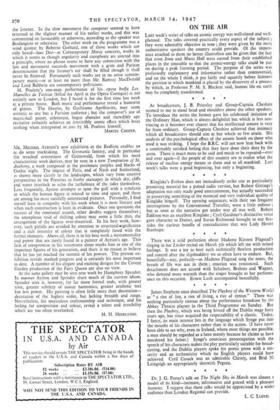ON THE AIR
LAST week's series of talks on atomic energy was well-timed and well- planned. The talks covered practically every aspect of the subject ; they were admirably objective in tone ; they were given by the most authoritative speakers the country could provide. Of the import- ance attached to them no better illustra6on can be given that the fact that even Jima and Music Hall were ousted from their established places in the timetable so that the atomic-energy talks could be put on during a peak listening period. The purpose of the series was professedly explanatory and informative rather than controversial, and on the whole I think, it put fairly and squarely before listeners the position in which mankind is placed by the discovery of a process by which, as Professor P. M.- S. Blackett said, human life on earth may be completely transformed.
* * As broadcasters, J. B. Priestley and Group-Captain Cheshire seemed to me to stand head and shoulders above the other speakers. To introduce the series the former gave his celebrated imitation of the Ordinary Man, which is always delightful but which is less con- vincing as it becomes ever clearer that his intellectual stature is very far from ordinary. Group-Captain Cheshire achieved that intimacy which all broadcasters should aim at but which so few attain. His analysis of the psychological effect of the atomic bomb on those who used it was striking. I hope the B.B.C. will not now lean back with a comfortably satisfied feeling that they have done their duty by the atom. There is much more to be said and much to be repeated—over and over again—if the people of this country ate to realise what the release of nuclear energy means to them and to all mankind. Last week's talks were a good beginning, but only a beginning.
• * * *
Kinglake's Eothen does not immediately strike one as particularly promising material for a potted radio version, but Robert Gittings's adaptation not only made good entertainment, but actually succeeded in preserving something of the essential and very individual quality of Kinglake hiniself. The opening sequences, with their too frequent interruptions by the Conventional Traveller, were a little tedious ; but as soon as the narrative got under way all was well. Robert Eddison was an excellent Kinglake ; Cyril Gardiner's distinctive voice gave character to Dmitri, and Susan Richmond brought to our fire- sides the curious bundle of contradictions that was Lady Hester Stanhope.
* * * *
There was a cold perfection about Madame Kirsten Flagstad's singing in her Lieder recital on March 5th which left me with mixed feelings. It was a joy to hear such technically flawless production and control after the slipshoddery we so often have to endure. But, beautifully—nay, perfectly—as Madame Flagstad sang the notes, the breath of life was not in them ; emotion was renounced. Such detachment does not accord with Schubert, Brahms and Wagner, who demand more warmth than the singer brought to her perform- ance on this occasion. Ernest Lush accompanied beautifully.
* *
James Stephens once described The Playboy of she Western World as "a riot of fun, a riot of living, a riot of syntax." There was nothing particularly riotous about the performance broadcast by the Abbey Theatre players in the Third Programme on Sunday. But then the Playboy, which was being hissed off the Dublin stage forty years ago, has since acquired the respectability of a classic. Today, I fancy, its main interest lies in the language which Synge put into the mouths of his characters rather than in the action. (I have never been able to see why, even in Ireland, where most things are possible, a man should be regarded as a hero merely because he claims to have murdered his father.) Synge's conscious preoccupation with the speech of his characters makes the play particularly suitable for broad- casting, and the Dublin players spoke his poetic prose with a sin- cerity and an authenticity which no English players could have achieved. Cyril Cusack was an admirable Christy, and Brid Ni Loingsigh an appropriately shrewish Pegeen.
* * * *
Dr. J. G. Porter's talk on The Night Sky in March was almost a model of its kind—intimate, informative and graced with a pleasant humour. I suggest that these talks would be appreciated by a wider audience than London Regional can provide. L. C. LLOYD.


































 Previous page
Previous page